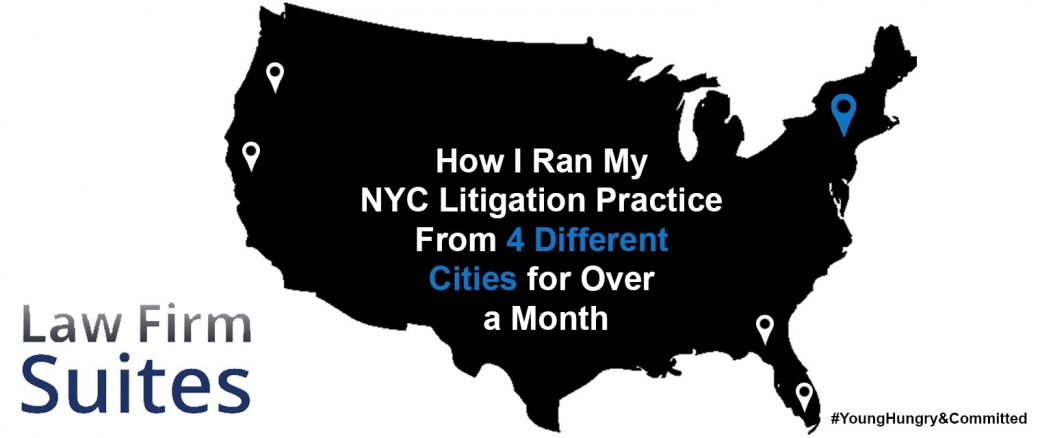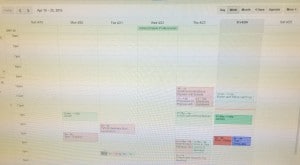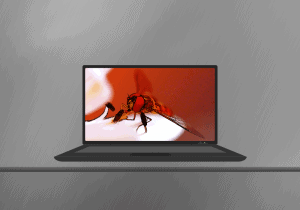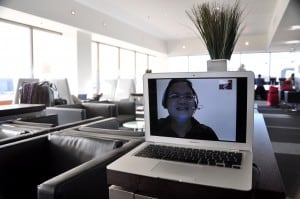Virtual office NYC lawyer Vivian Sobers describes how she successfully kept her solo litigation practice going from four different U.S. cities on two coasts for over a month.
Confession: I’ve been a little envious of one of my New York virtual office colleagues. It’s a litigation firm that I have gotten to know reasonably well because they send me appearance work from time-to-time.
What’s enviable about this firm is that their main office isn’t in NYC – they are based in Atlanta.
From what I can tell, the partners rarely get to the City but still seem to maintain a reasonably busy New York practice.
It’s confusing and inspiring all at the same time.
See, I can reconcile in my head how you can run corporate transactional type practice from afar. Your whole day is basically spent in front of a computer.
But if you’ve got to show up to court with any degree of regularity, how, exactly, do you get this done?
Challenge accepted.
When an opportunity came up to leave town for an extended period of time, I jumped on it.
I don’t really want to divulge when I was away because I didn’t really let anyone know that I was leaving town. But it happened within the past year for a period of a little over a month.
The experience was eye-opening, is very achievable, and is something I look forward to doing again.
Here’s how I was able to make it happen:
I set aside a budget to get back to NYC in case of an emergency.
Seems odd that this is the first thing I would mention, right? I bet you expected me to talk about cloud computing, video conferencing and coverage first, which I will get to in a bit.
But the reality is, the step that had the most influence on me being able to commit to leaving was setting aside some cash to buy a last minute plane ticket in case I absolutely had to return to NYC for an emergency.
I figured that if I was anywhere on the East coast, I was never further than a three-hour flight from my office. If I was on the West coast, I could take a red-eye and be in the office by 7:00 A.M. the next day.
For me, having the cash set aside to purchase a last minute plane ticket eliminated much of the anxiety about being away. If something came up, a same day plane ticket would be expensive, but I had the money already budgeted to come back.
Also, this didn’t mean that I had to cut my trip short. I budgeted for a last minute roundtrip ticket. I would simply come back to New York, handle my affairs, and fly back to my remote office. At most, I would lose a couple of days off my trip. No big deal.
I ended up not needing to use that money, but knowing I had it available removed a major mental barrier for leaving.
I cleared my calendar as best as I could.
I knew that I might take this trip a few months in advance. That gave me time to arrange my calendar to have minimal court appearances (or at least non-critical appearances).
I also was careful about what cases I was taking on for other attorneys. If heavy court activity was a possibility during the period I was planning to be away, I didn’t take on the extra work.
Most lawyers do this for short vacations, but you’d be surprised at how well you can push court dates for a month or more.
I made advance arrangements for appearance coverage.
Despite my best efforts to get my court calendar clear, I knew in advance that some appearances would be unavoidable.
I can get finicky about who I get to cover my appearances, and a few bad outcomes on routine appearances could have ruined this trip. So before leaving I did my best to find an appearance coverage “solution” that I would feel comfortable relying on.
I ended up choosing a service that finds experienced attorneys willing to make appearances on behalf of other lawyers. The great thing about this service is that they have a pool of attorneys to choose from, so I was able to find someone who I thought would have the best experience for any particular case that I needed help with.
I don’t know that I will ever be completely happy with having someone else cover my cases but, for the most part, these attorneys got the job done.
I recommitted to going paperless.
I’m a solo virtual office attorney who works without a legal assistant. I don’t have anyone who can retrieve documents for me when I’m out of the office. So, it’s almost a necessity for me to run a paperless office, and I mostly do.
But it’s easy to get lazy about keeping up with it. While it may be inconvenient to stop by my office in between court appearances to grab a document, I can usually get it done.
But this trip involved a fair amount of travel between cities. It wasn’t going to be practical for me to take my paper files with me on the road.
So the month before leaving I buckled down and reintroduced myself to my trusty scanner. We became good friends.
All my documents were scanned, organized and stored up on the cloud (a copy gets saved locally too).
With that completed, the only thing I needed to get work done was my laptop.
I made a plan to continue marketing while I was away.
If I ignored marketing for the several weeks that I was away I would have come home to a dry pipeline. Another point of anxiety that needed to be resolved before leaving.
But in reality, because I wasn’t going to be spending any time shuffling between courthouses, I would actually have a lot more time to devote to marketing.
Before I left I cued up a bunch of marketing activities that didn’t require face-to-face meetings. I got more involved with my Avvo marketing, I reached out to some networking contacts I had been ignoring (by phone and email), I got some writing done for my blog and I boosted my social media presence.
In fact, I got more marketing done while I was away than I had in the four months before leaving.
I got comfortable with video conferencing in case I needed it.
Before I left I tested out Google Hangout and Skype in case a client needed to be in touch and they were adamant about seeing my face.
I never had to use any video conferencing while I was away. But it was useful to be able to offer the option to clients in lieu of waiting to meet until I returned.
My clients were satisfied with the offer and seemed fine with having a phone conversation.
I got my story straight.
I didn’t really want to advertise to anyone that I was working from out of town for an extended period of time. I would be back in a few short weeks, I was well prepared to deal with any emergencies, and when I returned I would be picking things up as if I had never left.
But I wanted to have an explanation for not being available that wouldn’t make clients or colleagues nervous, but where I wasn’t being dishonest either.
This was never really going to be an issue unless someone wanted to have an in-person meeting, or a colleague wanted to refer appearance work.
I chose to just keep my explanation simple, but vague. This seemed to work.
In the case of an in-person meeting request, when asked, I would simply say my calendar was full (which was true) and I offered an after-hours video chat or phone call, or an in-person appointment the week I was expected back.
In the case of referrals that required court appearances, I simply explained that I didn’t have enough bandwidth to give the matter the attention it deserves (also true), but that my calendar would be freeing up [the week that I got back] (also true).
This all worked in my favor. The meeting requesters just assumed I was very busy and there was a high demand for my time. They were also satisfied by my extra effort to have an after-hours call or video chat.
My referring colleagues were also happy that I was self-aware enough to not take on cases that I didn’t have the bandwidth for, which actually bolstered my credibility with them.
What I gained by being away for so long.
I don’t know that I would ever run my litigation practice from another city on a permanent basis. What I love most about my job is being in court.
But the change in environment gave me some much needed perspective about my practice, and my life for that matter. Sometimes the only way to get that perspective is to physically remove yourself from your everyday reality.
I had a chance to re-engage with marketing techniques that I had been overlooking. I gave a lot of thought about where my firm had come from and where I wanted it to go. I made some strategies for how to improve the types of cases I was getting.
I also has some time to reflect on the things I like most about my life in New York, the things that could use some improvement and to decide how I would make changes.
But the biggest thing I gained is the confidence of knowing that I can take an extended break from New York City and still have a viable practice when I return.
I’m already thinking about which far-off place I’ll be going next.
Thinking about starting a law practice like Vivian?
Check out our Start-Up Program.
Vivian Sobers is a commercial litigator pursuing a solo law practice right out of law school. She is a client in Law Firm Suites’ Virtual Office Program. Vivian’s weekly blog series “Young, Hungry and Committed” documents the trials and tribulations of a young attorney navigating her way through the challenging world of self-employed legal practice.







